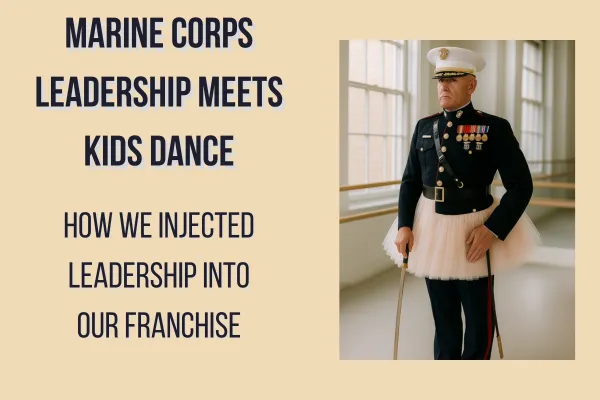
Bringing Marine Corps Leadership To Day Care Dance
From the Naval Academy to Dance Classrooms: What Leadership Really Looks Like in Small Business
When people think about owning a business, they often imagine someone with an MBA, a perfectly polished business plan, and a smooth-running operation. What they don’t imagine is a former Marine officer and a former RN building a kids’ dance franchise from the ground up—learning as they go.
My wife and I run a franchise called Tippi Toes Dance, where we bring fun, high-energy dance classes into schools and daycares. Like most small businesses, we started small, did everything ourselves, and slowly began to scale. And like many new business owners, we didn’t fully appreciate what happens when your leadership has to travel through layers of other people.
This past summer, we brought on a part-time manager. Seemed like a natural next step. But then we hit a wall—staff turnover. We expect some churn in the summer (our instructors are mostly college students), but this was more than normal. Something was off.
After a few conversations, the problem became clear: our values and expectations weren’t making it down the chain. What we thought we were communicating wasn’t being felt or reinforced.
So we stopped and looked inward.
My wife’s superpower is empathy. It’s what makes her a great salesperson—she can connect instantly with a parent or director and make them feel heard. But that same empathy made it hard to have tough conversations with staff. She didn’t want to hurt feelings, even when something needed to be corrected.
Me? I spent nine years in what I like to call a government-funded leadership academy—four years at the Naval Academy and five years as a Marine infantry officer. Difficult conversations don’t phase me and the main role of an officer is developing enlisted leaders.
So we built a plan.
We are going to start monthly counseling sessions for every team member. We will document performance, give feedback, and track growth. It’s simple, clear, and consistent. The greatest way to improve performance is to measure it.
Every midshipman at the Naval Academy memorizes a quote from John Paul Jones called The Qualifications of a Naval Officer. We adapted it for our world, renaming it The Qualifications of a Tippi Toes leader. It's now the backbone of how we train and evaluate leadership at every level.
One passage from the original:
No meritorious act of a subordinate should escape [the leader’s] attention or be left to pass without its reward, even if the reward is only a word of approval.
Conversely, he should not be blind to a single fault in any subordinate, though at the same time, he should be quick and unfailing to distinguish error from malice, thoughtlessness from incompetency, and well meant shortcomings from heedless or stupid blunder.
Why? Because culture doesn’t come from snacks at staff meetings. It comes from what you tolerate, what you reward, and what you hold people accountable to. And when you give your managers a clear framework—plus permission to take initiative—they step up.
None of this was perfect. We didn’t plan it all in advance. We made calls on the fly, adjusted when things didn’t work, and borrowed lessons from completely different parts of our life. And that’s exactly the point.
Franchises give you the playbook, but real people need more than a playbook. They need leaders.
Leadership in small business isn’t about having it all figured out. It’s about knowing your strengths, admitting your blind spots, and building systems that reflect the culture you want—one conversation at a time.
So if you’re someone with zero business experience, but you’ve led people, solved hard problems, or taken care of others—congrats. You may be a great fit as a franchise owner.
